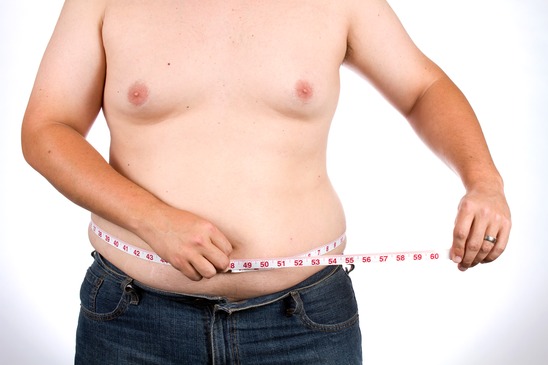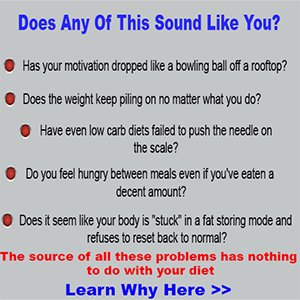Does Protein Help You Lose Belly Fat?
…Is The Greatest Nutrient Really A Potent Fat Burner?
Table Of Contests
-
The Benefits of Eating Protein
-
Protein DOES Help You Lose Belly Fat
-
Controls Appetite
-
Faster, Stronger Metabolism
-
Fewer Calories Consumed
-
Slows Weight Regain
-
The Quality Matters
-
One Final Note…
Combined With The Right Protein Mix And You Could See Results In As Little As 30 Days >>
Every weight loss program encourages the intake of protein. And for good reason:
 Protein is a much needed nutrient for boosting metabolic rate by increasing lean muscle tissue.
Protein is a much needed nutrient for boosting metabolic rate by increasing lean muscle tissue.
I know that’s a lot of big words that may, or may not, answer the big question:
Does protein help you lose belly fat?
The short answer is YES, protein does help you lose belly fat. But, we aren’t about short answers.
If you want to know EXACTLY how protein helps you lose belly fat, stick around.
The Benefits of Eating Protein
Back in the day, only bodybuilders increased their protein intake in order to build more muscle mass.
But now, we know a little more about protein, and understand that this powerful nutrient doesn’t just build lean muscle mass.
It is also a catalyst for a number of different functions that occur in your body.
Protein provides the building blocks for cells and may create the structural framework for hormones to develop.
Without adequate protein, your body may have a harder time producing necessary hormones, and it may slow down the repair of damaged cells.
So how does protein help you lose belly fat?
Protein Intake and Belly Fat Loss
There are a lot of ways that protein helps to burn belly fat. The factors include:
- Appetite suppression
- Increased metabolism
- Calorie reduction
- Prevention of weight regain
Let’s take a look at each one a little closer:
Appetite Suppression
 When you’re dieting—or even living life in general—you may get hungry. And this increased appetite may easily cause you to consume too many calories.
When you’re dieting—or even living life in general—you may get hungry. And this increased appetite may easily cause you to consume too many calories.
Normally, if you’re exercising, this may not be an issue. However, for 90 percent of the population, eating too many calories often leads to weight gain.
But:
Including more protein with each meal, may quietly control appetite, leaving you feeling fuller without giving you the hungry-all –the-time feeling.
So how does it work?
For starters, protein may slow the rate of digestion, therefore leading to better blood sugar control.
And this often leads to a slower release of sugar into the blood.
This results in lower blood sugar, preventing the dangerous spikes that increase food cravings.
| Protein controls blood sugar spikes, which is mainly responsible for increased food cravings. By controlling blood sugar, you may control appetite and prevent cravings from increasing caloric intake. |
Editors Note: Find Out How To Blast Belly Fat The Easy Way With THIS Simple Daily Trick
Increased Metabolism
In order to lose belly fat, you need to burn more calories than you consume. It’s a very simple equation:
Increase caloric expenditure = more weight loss and belly fat loss.
But:
How do you accomplish this? By increasing your protein intake.
Not only does protein burn calories JUST BY DIGESTING IT—it builds lean muscle mass, which burn calories all day long.
There is something called the thermic effect of food—or when your body burns calories by digesting foods.
Protein is one of the hardest nutrients for your body to digest, and often increases calorie burn just by digesting protein from your diet.
The result is an increase in your metabolic rate. Even a slight increase in your metabolic rate (from what you have now), should lead to a higher calorie expenditure and more weight loss.
|
Protein boosts your metabolic rate, which leads to a higher calorie expenditure. This could result in more calories burned and a reduction in body weight and body fat levels. |
Consume Less Calories
If you look at the section above, you need to burn more calories than you consume.
So eating smaller portions, eating more nutrient-dense foods, and consuming lower calorie foods could reduce the amount of calories you consume.
And protein should be part of that.
By replacing higher-calorie foods with protein, you are reducing the amount of calories you’re consuming, and you’re increasing your metabolic rate with harder-to-digest protein.
Studies consistently show higher protein meals may result in fewer calories consumed throughout the day.
One study in particular, showed study participants eating a higher protein diet, ate 441 FEWER calories by the end of the day.
This resulted in greater weight and body fat loss compared to the low-protein, and the control group.
High protein diets have also been linked to an increase in satiety hormones. Satiety hormones keep your body feeling full after a meal. And high-protein diets may increase these appetite-suppressing hormones.
| High protein diets may lead to as many as 441 FEWER calories consumed throughout the day. These calories add up—and could result in significant body fat and overall weight loss numbers. High-protein diets have also been linked to an increase in satiety hormones, which keep you feeling full after a meal. |
Prevents Weight Regain
If you’ve lost weight, and put the weight back on (and more), then you know about weight regain.
Weight regain is an interesting phenomenon. Due to a slower metabolism (associated with weight loss), it may be easier to gain weight after you’ve finished a diet.
But it’s not the only reason.
A lot of time, people who have lost weight, often go back to eating their normal diet, which is often higher in calories with imbalances in nutrients.
But:
Adding in a little extra protein may go a long way. Studies show that a moderate increase in protein (from 15 to 18 percent) prevented weight regain from occurring.
Could it be due to the thermic effect of food? The lower calories? Or the boost in your metabolism?
It could be caused by all three. The bottom line:
Not only can protein help in the weight loss puzzle, it may also prevent weight regain from occurring.
| A higher protein intake has been linked to less weight regain over time. There are a number of different reasons this may occur, however, it’s important to note that eating more protein is linked to a lower risk for regaining lost weight. |
Try This: Delicous Dessert Recipe To Try That Uses Protein Powder
One Note To Consider
Although protein can help you lose belly fat, it’s important to understand one thing:
The QUALITY of the protein matters. Low-quality protein may not result in as much belly fat loss compared to a higher-quality protein.
In fact, studies consistently show higher-quality protein may boost belly fat loss, boost your metabolism, and could even boost keep weight regain to a minimum.
The Final Word On Protein And Belly Fat Loss
Studies consistently show that high-protein diets may be linked to a loss in belly fat. And there are a number of different reasons why.
High protein diets may suppress your appetite, increase your metabolism, reduce cravings, and could lead to fewer calories consumed throughout the day.
The fact is simple:
-
High protein diets may reduce cravings by as much as 60 percent…therefore keeping you from eating more or craving sugar.
- High protein diets may boost metabolism, which could lead to a 60 to 100 increase in your daily caloric burn.
-
High protein diets may keep you from eating more. Studies show that protein may boost satiety hormones, which could cut down on total calorie intake by 441 calories
- High protein diets may prevent weight regain from occurring.
So, if you’re looking to boost your weight and belly fat loss, then including more protein in your daily, weekly, monthly, and yearly nutrition plan should do the trick.
[DOWNLOAD FREE 51 Protein Recipes] Want Easy Ways to Include Protein In Your Fat Loss Plans?
References:
1. Leidy HJ, Tang M, Armstrong CL, Martin CB, Campbell WW. The effects of consuming frequent, higher protein meals on appetite and satiety during weight loss in overweight/obese men. Obesity (Silver Sping). 2011 Apr;19(4):818-24.
2. Veldhorst MA, Westerterp-Plantenga MS, Westerterp KR. Gluconeogenesis and energy expenditure after a high protein, carbohydrate-free diet. Am J Clin Nutr. 2009 Sep;90(3):519-26.
3. Johnston CS, Day CS, Swan PD. Postprandal thermogenesis is increased 100% on a high-protein, low-fat diet versus a high-carbohydrate, low-fat diet in healthy, young women. Am Coll Nutr. 2002 Feb;21(1):55-61.
About Jayson Hunter & Jaylab Pro

Jaylab Pro was founded by Registered Dietitian Jayson Hunter. Jayson has been recognized as one of America's foremost weight loss experts by America's Premier Experts™. He has also been featured in USA Today for this accomplishment. Jayson is also a best-selling author having co-authored multiple books in health & fitness and business growth. Jayson and the Jaylab Pro team are proud to create content that helps improve the lives of millions of people around the world. We hope you enjoy it just as much as others have.
 If you order a JayLabPro SmartShip product or any Combo Package, we will automatically ship you a new supply of the product or products you have ordered every month, starting 30 days after your initial order is shipped, and continuing until you cancel. The credit card you are using today will be billed the lowest available price for those product or products when your order is shipped, but shipping will be FREE. You may log into your customer account or call our customer service department toll-free at 1-888-9GETPRO (1-888-943-8776) between the hours of 8am – 9pm EST Mon-Fri to cancel future shipments, customize the timing of your shipments, or change the credit card used for billing.
If you order a JayLabPro SmartShip product or any Combo Package, we will automatically ship you a new supply of the product or products you have ordered every month, starting 30 days after your initial order is shipped, and continuing until you cancel. The credit card you are using today will be billed the lowest available price for those product or products when your order is shipped, but shipping will be FREE. You may log into your customer account or call our customer service department toll-free at 1-888-9GETPRO (1-888-943-8776) between the hours of 8am – 9pm EST Mon-Fri to cancel future shipments, customize the timing of your shipments, or change the credit card used for billing.










